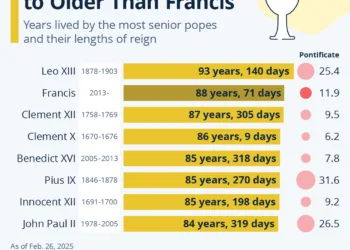The Legacy of Pope Francis: A Historic Pontificate
Pope Francis, the first pontiff from Latin America, made a remarkable impact on the global Roman Catholic Church during his tenure. His recent passing on Easter Monday at the age of 88 has prompted reflection on his life’s work, contributions, and the historic significance of his papacy.
A Brief Biography of Pope Francis
Early Life and Religious Vocation
Born Jorge Mario Bergoglio in Buenos Aires, Argentina, Pope Francis grew up in a modest family of Italian immigrants. He entered the Society of Jesus (Jesuits) at the age of 22 and was ordained a priest in 1969. His early experiences shaped his focus on social justice and pastoral care, which would later define his papacy.
Ascension to Papacy
In March 2013, Bergoglio was elected as Pope Francis during the conclave held after the resignation of Pope Benedict XVI. His election was groundbreaking not only because he was the first Latin American pope but also because he was the first Jesuit to hold the position.
A Pope for the Marginalized
Advocacy for Migrants and Refugees
Throughout his papacy, Pope Francis was vocal about the plight of migrants and refugees. He emphasized the importance of welcoming and protecting those who flee from violence, poverty, and persecution. His heartfelt speeches and actions, including visits to refugee camps, resonated globally and ignited dialogues about immigration and human rights.
Environmental Stewardship
Pope Francis also made significant strides in advocating for environmental issues. His encyclical "Laudato si’" urged the world to address climate change and protect our planet. By framing caring for the environment as a moral imperative, he strengthened the connection between faith and ecological responsibility.
Social Justice Initiatives
Francis consistently spoke against economic inequality and the unethical practices that contribute to poverty. He championed the rights of the marginalized, urging the Church and society at large to stand for those without a voice.
The Historic Context of His Papacy
A Shift in Tradition
Historically, the majority of popes have come from Italy, with a total of 217 out of 266 pontiffs originating from this nation. Pope Francis broke from this tradition, representing a broader, more inclusive Catholic Church. His role as the first non-European pope since Gregory III marked a significant moment in Church history, emphasizing a shift towards a more global perspective.
Global Reception and Influence
Pope Francis’s messages of compassion and humility have resonated with many, fostering a renewed sense of hope within the Church. His ability to connect with diverse populations, from urban dwellers to rural communities, allowed him to engage with the faithful on various levels.
Potential Successors and the Future of the Papacy
Cardinal Contenders
In the wake of Pope Francis’s passing, speculation about his successor has begun. Notable cardinals mentioned as potential candidates include:
-
Cardinal Peter Erdo (Hungary): Known for his conservative views and leadership within the Church.
-
Cardinal Pietro Parolin (Italy): The current Secretary of State, a seasoned diplomat with experience in Vatican diplomacy.
-
Cardinal Peter Turkson (Ghana): An advocate for social justice and sustainable development.
-
Cardinal Luis Tagle (Philippines): Renowned for his charisma and pastoral approach, appealing to the youth.
-
Cardinal Mario Grech (Malta): Plays a pivotal role in the Synod of Bishops.
- Cardinal Matteo Zuppi (Italy): Gained recognition for his initiatives on peace and reconciliation.
A New Era for the Catholic Church
The transition following the departure of such a pivotal figure as Pope Francis presents both challenges and opportunities for the Catholic Church. The selected successor will undoubtedly face the task of continuing the mission of inclusivity and engagement while addressing contemporary global issues.
In moments of reflection, Pope Francis leaves behind a legacy of compassion, social justice, and environmental awareness. His commitment to speaking out for the marginalized and advocating for change will continue to influence the Church’s trajectory for years to come.



